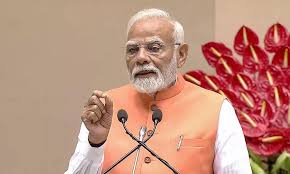No Indian will ever forget how spirit of Constitution was violated, Parliament muzzled: PM Modi on Emergency

PM Modi’s remarks sparked widespread debate across social media platforms. Supporters praised his words as a timely reminder of a critical moment in India’s democratic journey. Hashtags like #Emergency1975, #NeverForgetEmergency, and #ConstitutionUnderThreat trended on X.
Prominent civil society voices and youth organizations also used the opportunity to educate people about the period. Some shared personal stories of relatives who were jailed or censored during the Emergency. Others criticized the government, accusing it of drawing attention away from current issues by invoking the past.
“Emergency must be remembered, but not selectively. We must also address present-day curbs on press and civil rights,” wrote one political science professor from Delhi University.
Academic and Legal Perspectives
Constitutional experts have long debated the Emergency’s legal and moral implications. The Supreme Court’s infamous ADM Jabalpur v. Shivkant Shukla ruling in 1976, which upheld the suspension of habeas corpus during Emergency, remains a stain on India’s judicial legacy.
In recent years, the Court has revisited and criticized this verdict. Legal scholars point to this period as a cautionary tale of what happens when the executive overpowers both the judiciary and legislature.
“Modi’s reminder is valid. But the lesson is that eternal vigilance is required—not just during historical events, but also today,” said Justice (Retd.) Madan Lokur in a past interview.
Modi’s Continued Focus on Emergency in Political Rhetoric
This is not the first time PM Modi has referenced the Emergency. In multiple elections—Lok Sabha 2014, 2019, and state polls—Modi and BJP leaders have used it to highlight the alleged authoritarianism of Congress.
He frequently positions the BJP as the guardian of democratic values, in contrast to what he calls the “dynastic politics” of the Congress. This narrative resonates with younger voters who are increasingly exploring India’s political history online.
“We will never let such a period return. The Emergency was imposed to protect one leader. Today, we work to protect the people,” Modi said during his Mann Ki Baat broadcast last year.
Youth Engagement and Digital Storytelling
This year, the BJP has intensified its digital storytelling strategy. Infographics, animated reels, and short documentaries are being circulated on WhatsApp, YouTube, and Instagram. Many are designed in regional languages to target audiences in rural India.
One such video explains the Emergency using real accounts of students, journalists, and lawyers who were jailed. The aim, party leaders say, is not just to criticize Congress but to build democratic consciousness.
“We want young Indians to know that democracy wasn’t handed to us easily. People fought and suffered for it,” said BJP IT cell head Amit Malviya.
Congress’s Legacy and Regret
Congress, for its part, maintains that the Emergency was a mistake—but a “corrected” one. In a 2011 speech, Sonia Gandhi publicly stated that “we learned from that mistake and India’s democratic institutions have grown stronger.”
However, the BJP and other opposition parties argue that Congress never truly apologized. Modi’s consistent references to the period serve to ensure that it stays alive in public memory.
“No official apology, no formal resolution. That speaks volumes about their mindset,” said Union Minister Smriti Irani during a recent press interaction.
Emergency and Press Freedom: Then vs Now
One of the most affected institutions during the Emergency was the Indian press. Newspapers were required to seek government approval before publishing. Several publications shut down or were forced to toe the government line.
Today, debates about press freedom continue. Critics of the Modi government argue that while there is no formal censorship, media houses often self-censor due to fear of economic or legal consequences.
“Modi speaks of the Emergency, but what about today’s pressures on journalists? We must examine both the past and present with equal honesty,” said a senior editor at The Hindu.
Conclusion: Why Remembering the Emergency Matters
By invoking the Emergency, PM Modi aims to remind citizens of the fragility of democratic institutions and the need to protect them. Whether one agrees with his methods or not, the reminder serves as a historical checkpoint and a political flashpoint.
India’s democracy has evolved over the decades, but the scars of 1975 remain in memory and policy. Modi’s remarks reflect a broader effort to frame political identity around constitutional values, freedom, and institutional strength.
“We must all stay committed to the values enshrined in the Constitution. Freedom is not guaranteed unless we defend it,” Modi concluded in his post.






